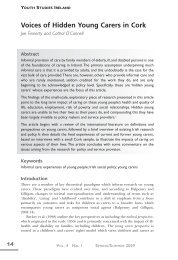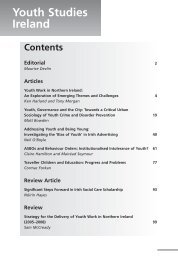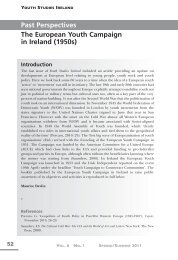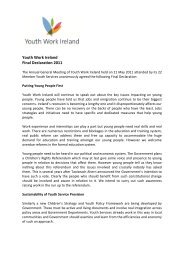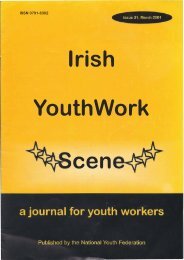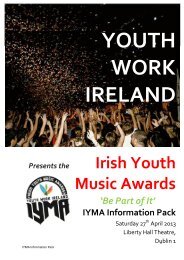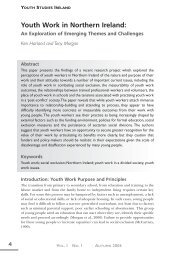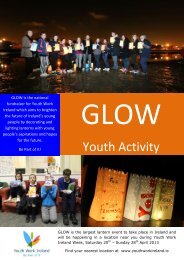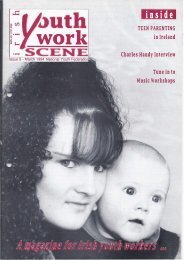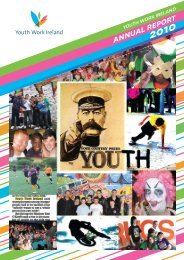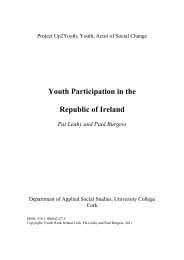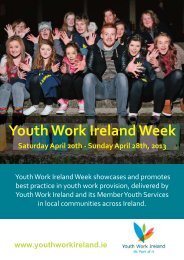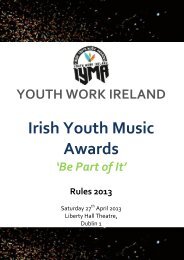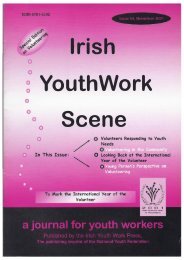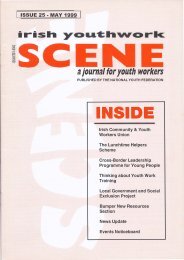Issue 68: June 2011 - Youth Work Ireland
Issue 68: June 2011 - Youth Work Ireland
Issue 68: June 2011 - Youth Work Ireland
Create successful ePaper yourself
Turn your PDF publications into a flip-book with our unique Google optimized e-Paper software.
IYWC LIBRARYNEW ResourcesA Handbook of Children and YoungPeople’s ParticipationPerspectives from Theory and Practiceby Barry Percy‐Smith & Nigel Thomas, 2010A Handbook of Children andYoung People's Participationbrings together key thinkers andpractitioners from diversecontexts across the globe toprovide an authoritative overviewof contemporary theory andpractice around children’sparticipation. Promoting the participation ofchildren and young people – in decision-makingand policy development, and as active contributorsto everyday family and community life – hasbecome a central part of policy and programmeinitiatives in both majority and minority worlds.This book presents the most useful recent work inchildren’s participation as a resource for academics,students and practitioners in childhood studies,children’s rights and welfare, child and familysocial work, youth and community work,governance, aid and development programmes. Thebook introduces key concepts and debates, andpresents a rich collection of accounts of the diverseways in which children’s participation isunderstood and enacted around the world.Beyond Educational Disadvantageby Paul Downes and Ann Louise Gilligan, 2007This book presents contributionsfrom over forty leading educationalistsin <strong>Ireland</strong>, giving voice tothe reality that the educationsystem needs to change anddevelop in order to meet the needsof a high proportion of students atrisk of early school leaving. Itexplores the myth that there issufficient investment in education to secure thefoundation of the ‘Celtic Tiger’ economy andhighlights the need for a focus on education thatdoes not simply reduce education to schooling. Awider focus is held throughout on a life-cycleapproach to education, including pre-schooleducation and adult and community education, ascentral to moving beyond disadvantage. The bookexplores a range of themes, which, whileinterlinked, call for separate in-depth analysisacross a number of disciplines, including education,psychology, philosophy, sociology and socialpolicy. These themes focus on adult andcommunity education, intercultural education,literacy and numeracy, child-centred research, thearts and emotional expression.Creative Studies for theCaring Professionby Denise Lyons, <strong>2011</strong>A unique new Irish textproviding an introduction to thetheory underpinning thepractice of using the creativearts as a tool or intervention invarious social care andcommunity scenarios. Thestructure of the book providesstudents with a comprehensiveoverview of best practice in the field: – Part 1introduces the theory behind using the creative arts– Part 2 describes the practical use of the creativearts – Part 3 details creative activities for use inpractice. It highlights the use of various creativeactivities as a tool or intervention within a varietyof social care, early childhood or communitysettings. It explores the benefits of engaging increative activities, such as: – Relationship development– Meeting new people – Learning throughplay – Becoming more self-aware – Means ofpersonal expression – Means of communication –Having fun. It also facilitates skills-based learning,while also preparing the student for working as partof a multidisciplinary team.Irish <strong>Youth</strong> <strong>Work</strong> Scene 18 <strong>Issue</strong> <strong>68</strong>, <strong>June</strong> <strong>2011</strong>



